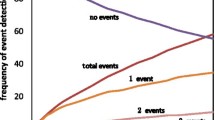Abstract
Genomic maps often do not specify the order within some groups of two or more markers. The synthesis of a master map from several sources introduces additional order ambiguity due to markers missing from some sources. We represent each chromosome as a partial order, summarized by a directed acyclic graph (DAG), to account for poor resolution and of missing data. The genome rearrangement problem is then to infer a minimum number of translocations and reversals for transforming a set of linearizations, one for each chromosomal DAG in the genome of one species, to linearizations of the DAGs of another species. We augment each DAG to a directed graph (DG) in which all possible linearizations are embedded. The chromosomal DGs representing two genomes are combined to produce a single bicoloured graph. From this we extract a maximal decomposition into alternating coloured cycles, determining an optimal sequence of rearrangements. We test this approach on simulated partially ordered genomes.
Preview
Unable to display preview. Download preview PDF.
Similar content being viewed by others
References
Bader, D.A., Bernard, M.E., Moret, B.M.E., Yan, M.: A linear-time algorithm for computing inversion distance between signed permutations with an experimental study. Journal of Computational Biology 8, 483–491 (2001)
Hannenhalli, S., Pevzner, P.A.: Transforming men into mice polynomial algorithm for genomic distance problem. In: Proceedings of the IEEE 36th Annual Symposium on Foundations of Computer Science, pp. 581–592 (1995)
Hannenhalli, S., Pevzner, P.A.: Transforming cabbage into turnip (polynomial algorithm for sorting signed permutations by reversals). Journal of the ACM 48, 1–27 (1999)
Tesler, G.: Efficient algorithms for multichromosomal genome rearrangements. Journal of Computer and System Sciences 65, 587–609 (2002)
Zheng, C., Lenert, A., Sankoff, D.: Reversal distance for partially ordered genomes. In: Bioinformatics 21, supplementary issue, Proceedings of ISMB 2005 (2005)
Author information
Authors and Affiliations
Editor information
Editors and Affiliations
Rights and permissions
Copyright information
© 2005 Springer-Verlag Berlin Heidelberg
About this paper
Cite this paper
Zheng, C., Sankoff, D. (2005). Genome Rearrangements with Partially Ordered Chromosomes. In: Wang, L. (eds) Computing and Combinatorics. COCOON 2005. Lecture Notes in Computer Science, vol 3595. Springer, Berlin, Heidelberg. https://doi.org/10.1007/11533719_8
Download citation
DOI: https://doi.org/10.1007/11533719_8
Publisher Name: Springer, Berlin, Heidelberg
Print ISBN: 978-3-540-28061-3
Online ISBN: 978-3-540-31806-4
eBook Packages: Computer ScienceComputer Science (R0)




